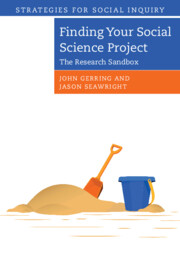Book contents
- Finding Your Social Science Project
- Strategies for Social Inquiry
- Finding Your Social Science Project
- Copyright page
- Contents
- Detailed Contents
- Figures
- Tables
- Acknowledgments
- Glossary
- 1 Introduction
- Part I Overview
- Part II Playing with Ideas
- Part III Playing with Data
- Part IV Playing with Theories
- Part V Conclusions
- 11 From Exploration to Appraisal
- Appendix A Surveys and Interviews
- References
- Index
11 - From Exploration to Appraisal
from Part V - Conclusions
Published online by Cambridge University Press: 06 October 2022
- Finding Your Social Science Project
- Strategies for Social Inquiry
- Finding Your Social Science Project
- Copyright page
- Contents
- Detailed Contents
- Figures
- Tables
- Acknowledgments
- Glossary
- 1 Introduction
- Part I Overview
- Part II Playing with Ideas
- Part III Playing with Data
- Part IV Playing with Theories
- Part V Conclusions
- 11 From Exploration to Appraisal
- Appendix A Surveys and Interviews
- References
- Index
Summary
Chapter 11 concludes our study with a close look at the transition from exploration to testing. First, we discuss various steps involved in vetting a research project. This includes a calculation of costs, payoffs, and risks; a consideration of research ethics; and extensive market-testing. In the second section, we discuss when to go public with preliminary ideas and findings. In the third section, we consider what to reveal about the research process. Finally, we discuss the contrast between exploratory to confirmatory research.
- Type
- Chapter
- Information
- Finding your Social Science ProjectThe Research Sandbox, pp. 245 - 260Publisher: Cambridge University PressPrint publication year: 2022

